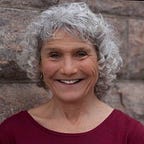I (Mostly)Like Growing Older
I want my kids to see self-awareness and acceptance as the up sides of aging
A jar of quinoa nearly pushed me over the edge. There I stood, twisting the screw top with all my might, my face reddening, my cheeks puffed out as I took deep heaving breaths and emitted groans of strain. Harder and harder I gripped and twisted, twisted and gripped, at one point bracing the plastic jar between my knees. I yelled. I cursed. I banged it on the counter as tears welled. Finally, I used an old-fashioned can opener to pry the top away from the jar’s mouth, loosening it enough to get it off. Panting and exhausted, I felt triumphant, and old.
It had been a tough month. Weeks earlier, I had slipped on slush and fractured my right wrist, condemning me to a stiff half-arm splint that rendered my dominant hand useless. Now, the activities of daily living — ADLs as geriatricians call them — dressing myself, flossing my teeth, and doing dishes felt like major undertakings. Even with an intact wrist I’d struggled to open jars of rice and pickles, a vacuum sealed pouch of coffee, and a bottle of canola oil. “When did bottles and jars become so damned impossible to open?” I, feeling shamefully feeble, asked my husband as he tied my shoes.
I knew the answer, of course, and I didn’t like it.
As a recreational athlete who swims nearly two miles a day, walks about five, and has, according to my internist, the cardiovascular health of a twenty-year-old, I bristle at the mere hint that I am physically weak, vulnerable or worse, brittle. I deplore any suggestion or sign — like not being able to open a jar — that at sixty-three, I should expect less of myself. After all, a broken bone used to be no big deal, an annoyance whose healing I took for granted, while tightly closed jars presented an opportunity to flaunt my strength.
But a few recent falls and urgent-care visits have changed my thinking and, more importantly, how I move through the world: from full to half throttle, carefree to cautious, my gaze not on the horizon but the rocks, roots, black ice, and broken sidewalks waiting to trip me.
Now, as I reluctantly reckon with growing older, I’m trying to recognize — and show my grown children — the achievement that aging is.
Like most youngsters, my perceptions of aging came from observing the oldest person closest to me — my single mother. When I was 12, Mom was 50, hardly old from where I sit today, but ancient to my adolescent eyes. Yet, I didn’t perceive her as ‘old’ until I realized that she regarded her own aging and the accompanying weight gain, wrinkling skin, and achy joints as a battle to wage with diets, diuretics, skin creams, and every arthritis remedy she could find, including eating whole broiled lemons. She refused my attempts to recognize her birthday because she found nothing to celebrate in growing older.
Back then, I couldn’t imagine ever hating my birthday. (I still can’t!) But I did wonder: Would my body turn against me when I reached my mother’s age? Would there be a time when I felt not excited but ashamed about growing older? Children take cues from their parents, and my cue was to age more healthfully than my mother did, for my sake and for that of my kids.
Committing myself to rigorous daily exercise has been the easy part. The challenge has been staying focused on the present and not romanticizing my youth. Of course, there was much to enjoy about being young: falling in love for the first time and living life on my terms without having to answer to my mother. But during those ‘glory days’ I also entered toxic relationships, not because they helped me flourish, but because I feared being alone; constantly chased jobs that I thought would fulfill and define me; and, withstood abusive bosses whose opinions of me I valued more than my own.
The best that I got from these experiences was an understanding of the kind of relationship I deserved, the career I wanted, and the sort of treatment I couldn’t and wouldn’t tolerate. They taught me about myself. They built my backbone. I wouldn’t choose to revisit them but if I had to, I could without feeling powerless, frightened, or crushed because at long last, I know and like (for the most part) who I am.
I wish I could instill this perspective directly into my grown children, without them having to endure the hard parts of young adult life. But all I can do is assure them that these hard parts will eventually lead to self-knowledge, which can make growing older a gift.
Sure, I’d love to have knees that don’t stab me from the inside, see a lineless face in the mirror without tiny black hairs curling under my chin, and speak at what I think is a normal volume, without my kids pointing out that I’m yelling. Indeed, when I spend hours hunting for a cellphone that’s in my pocket or call my daughter or son by the dog’s name, I grieve for my younger self. Then I let the moment pass, consider the self-awareness, and esteem that I have gained, and know that I wouldn’t go back a day.
